TRIFOCAL-/MULTIFOCAL LENSES: NO MORE GLASSES, NO MORE READING GLASSES!
Whether reading your smartphone or a newspaper: in the meantime if you have to read the text at an ever-increasing distance, then here is the vision impairment in the close range. Presbyopia onsets around 45 years when reading and viewing close objects becomes increasingly more difficult. Reading glasses are then needed to see clearly. People who already wear glasses for distance vision, then need a second pair; or progressive lenses.
EuroEyes implants the latest generation trifocal/multifocal lenses to give you clear near, middle and distance vision. This is a first-class method of correcting your presbyopia and enables you to live a life long without glasses. You can feel safe with us: EuroEyes has performed most trifocal lens implantations worldwide. The blade-free implantation is also carried out with the help of LenSx – the most advanced technology on the market.
YOUR ADVANTAGES OF THE TRIFOCAL AND MULTIFOCAL LENS
Painless, outpatient procedure
Restoration of the natural visual range
Lifelong freedom from glasses
Vision remains constant and no longer changes
Prevention of cataract
Well-tolerated trifocal/multifocal lens can remain permanently in the eye
The lenses are not visible
Clinical studies show that 97% of all patients who received trifocal/multifocal lens exchange surgery on both eyes no longer need glasses ever after: reading, shopping, PC work, driving a car, also shaving and make-up application are finally possible again without glasses.
UNIQUE FEATURES ACCORDING TO THE HIGHEST QUALITY STANDARDS
The trifocal and multifocal lenses used by EuroEyes are premium lenses that meet the highest quality standards:
high optical quality
less scattered light phenomena
less glare effects
better contrast vision under reduced light conditions (e.g. twilight and at night)
THE STEPS IN A REFRACTIVE LENS EXCHANGE PROCEDURE
Preparation of the eye
The surgery is performed on an outpatient basis and usually takes 15 minutes per eye. Before the procedure, the eye is anesthetized with drops so that the patient does not feel any pain during refractive lens exchange. The eye is opened with a tiny corneal incision, which heals seamlessly.
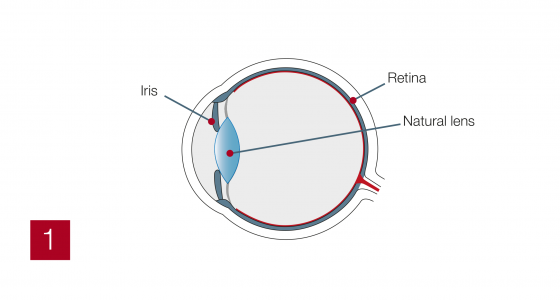
Removal of the lens
The anterior lens envelope is opened in a circular fashion. Then the lens core is removed. The rest of the lens envelope remains and serves as a ‘holding apparatus’ for the new lens.
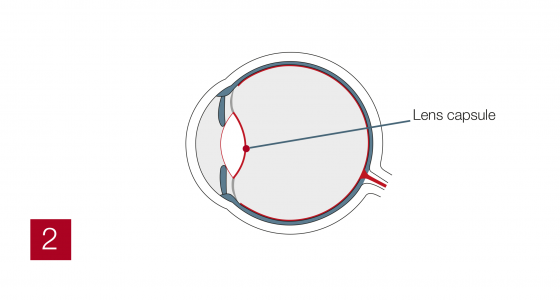
The trifocal and multifocal lens
Each patient receives a trifocal/multifocal lens that is ideally adapted to his or her individual needs. This well-tolerated artificial lens can remain permanently in the eye and is not visible.
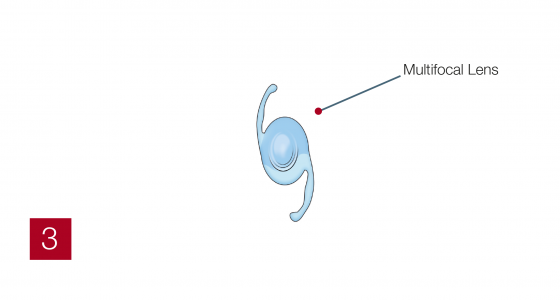
Implantation of the trifocal and multifocal lens
The surgeon inserts the new lens into the eye with an injector. The lens unfolds and is properly placed in the empty lens envelope by the surgeon. The trifocal/multifocal lens corrects presbyopia in addition to other existing vision disorders (near-, farsightedness and astigmatism).
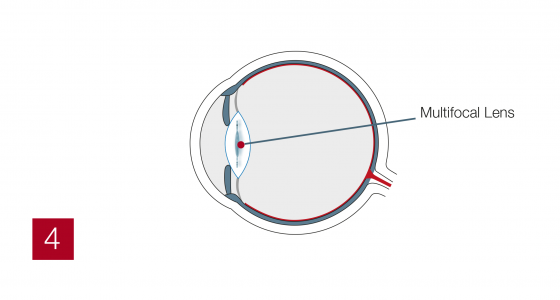
THE TREATMENT PROCEDURE FOR TRIFOCAL AND MULTIFOCAL LENSES

1. Counseling session and aptitude test
Measurement of all relevant eye parameters
Diagnosis whether you are suitable for trifocal/multifocal lens treatment
In-depth consultation
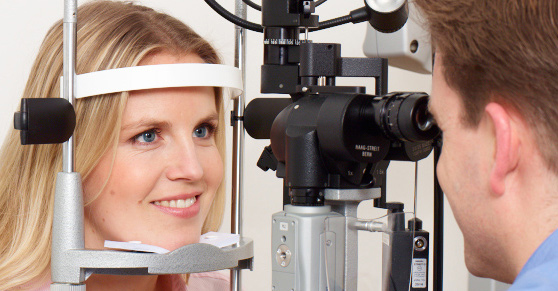
2. Preliminary medical examination
Intensive preliminary ophthalmological examination and measurement of your eyes
Detailed treatment explanation by a medical specialist
Duration of examination usually 2 hours
Before this appointment you are not allowed to wear soft contact lenses for one week and hard contact lenses for two weeks
You will receive an aftercare kit, including an eye patch and a drip schedule, for the days following your treatment. The contents and prescribed medications will be explained to you in detail by our staff.

3. On the day of your trifocal/multifocal lens treatment
Please bring someone to accompany you
We recommend that you wear comfortable clothing
Please refrain from wearing perfume and make-up on the day of your lens treatment
You can eat and drink regularly on the day of treatment, please do not smoke.
The total duration of this outpatient surgery is 10 – 15 minutes per eye.
The operated eye is protected by an eye bandage until the next day.
By the way: If it is about both eyes, we usually treat them on two consecutive days.

4. After your lens surgery
Please do not rub your eyes
Apply eye drops several times a day as directed by a doctor
Use artificial tears as needed
You can come back to work after 2-4 days
Sports activities are possible after approx. 2-3 weeks, avoid swimming and sauna in the first 3-4 weeks as well as combat and ball sports
Check-ups are usually: after 1 day – 1 week – 1 month -3 months
Driving a car is allowed again only after permission of the doctor
THE PROPERTIES OF THE LATEST GENERATION OF LENSES ARE OUTSTANDING AND OFFER THE HIGHEST QUALITY
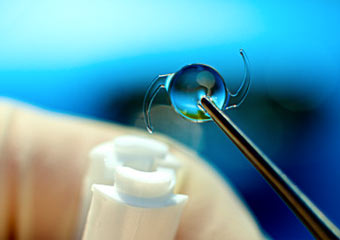
We use trifocal and multifocal lenses of the latest generation.
They have patented high-performance optics and open up the possibility for you to see in everyday life both at near and at medium distances and in the distance without aids.
The Trifocal Premium lenses are manufactured with computer-controlled diamond tools.
This means the highest possible precision and optical premium quality for you.
The optics of the lenses are manufactured using the patented SMP technology:
A special process reduces stray light phenomena, which always occur with trifocal/multifocal lenses, to an absolute minimum. The positive effect: less glare and fewer halos! Aspherical optics provide optimized image quality and improved contrast vision.
Lenses protect the sensitive retina and are optionally equipped with an extended light protection filter in addition to a UV filter.
This protective function is used in ophthalmology, especially for the prevention of macular degeneration (AMD). No matter whether presbyopia or cataract, whether nearsightedness, farsightedness or astigmatism, clinical studies show that 97% of people operated on no longer need glasses after implantation of trifocal and multifocal lenses.
The LenSx® Revolution: More precision through blade-free implantation
The femtosecond laser LenSx® enables blade-free implantation of artificial lenses for the treatment of cataracts for the first time – and is thus revolutionary in this sector. Several steps of the previous surgical method are combined in this laser lens surgery, making the surgeon’s scalpel unnecessary. The laser offers two major advantages over the previous method: Firstly, greater precision thanks to more exact positioning of the artificial lens during lens replacement. On the other hand, greater safety thanks to high-precision laser cuts.
EuroEyes is one of the first clinic groups and competence center for lens surgery in Germany to use the LenSx® in the field of laser lens exchange and now offers it at many locations – once again demonstrating a pioneering spirit. Because only the most modern and gentle methods are in line with the philosophy of EuroEyes: not only to correct your refractive error, but to constantly improve the quality of your treatment as well as the quality of your vision.
Trifocal lenses FAQ – What does it mean when my vision is not good after surgery?
Trifocal lenses FAQ – What side effects are possible?
Trifocal lenses FAQ – What is the duration of the procedure?
Trifocal lenses FAQ – Is the procedure painful?
OUR TOP SURGEONS
GENERAL INFORMATION ABOUT TRIFOCAL AND MULTIFOCAL LENSES
Presbyopia typically develops between the ages of 40 and 50: small print becomes increasingly hard to read, and you become dependent on reading glasses. Even if you have suffered from nearsightedness or farsightedness earlier in your life, you will eventually develop presbyopia, and will need bifocals or several glasses.
The implantation of the multifocal lens, also known as multifocal intraocular lens, is a safe, precise, and tested procedure for the correction of presbyopia. Basically, the natural lens of the eye is replaced with an artificial lens. This Refractive Lens Exchange (RLE) is a proven procedure as it has been used for decades in cataract treatments. The cataract treatment is the most commonly performed surgery in the world. You can therefore approach your treatment with a clear conscience.
WHAT IS A MULTIFOCAL LENS?
The multifocal lens is a highly developed artificial lens with several focal points, and it thereby enables clear vision in various distances – without the need for glasses. This well tolerated lens can permanently stay in the eye and is not visible. In addition to presbyopia the correction of myopia, farsightedness and astigmatism can be possible with artificial lenses.
You can feel safe with us: EuroEyes has performed the most intraocular lens implants in Germany and can prove many years of experience. Blade-free implantation is also performed using LenSx laser – the most advanced technology on the market.

PRECISION THANKS TO LASER
To enable an even greater accuracy and perfection, EuroEyes uses the LenSx® femtosecond laser for the surgical procedure, which takes several essential steps of the lens surgery that were previously performed manually by the surgeon.
This laser eye treatment used for lens exchange, allows a painless and precise dissection of different layers of tissue in the eye. It thus offers two advantages over the manual technique: first of all, the lens exchange is precise because the trifocal/multifocal lens can be positioned accurately, and second of all, safer because the laser incisions are more precise than hand-guided incisions.
EuroEyes is one of the first LASIK clinical groups in Germany to apply the LenSx® in the field of laser lens exchange.
FREQUENTLY ASKED QUESTIONS ABOUT MULTIFOCAL LENSES
Trifocal/multifocal Intraocular lenses (M-IOL) enable, by distributing the incoming light in three foci, a sharp vision for reading, intermediate distance and one for the far. The area between near and far can thereby usually be managed in everyday life without the need for glasses.
For patients who have already reached presbyopia, which usually appears between the ages of 40 and 50. Suddenly, the arms are not long enough to hold a newspaper or a book far enough to make the letters appear clear – reading glasses become necessary. Even people who used to be nearsighted or farsighted when they were younger, will over the years also be affected by presbyopia.
Toric multifocal lenses can not only correct presbyopia, but also an existing astigmatism. In contrast to spherical lenses, which have a simple round curve, the shape of the toric lenses is more complex because a crooked cornea is not uniformly shaped. The irregularly shaped cornea causes blurred, distorted images and thus restricts vision. Thanks to the toric multifocal lenses, the blurred visual impression of the astigmatism and presbyopia can be corrected in one step. You can find out more about toric lenses here.
Multifocal lenses can result in a slight loss of contrast. This often causes halos to appear around light sources. However, our brain learns to deal with such changes, and over time the affected patients will hardly notice them.
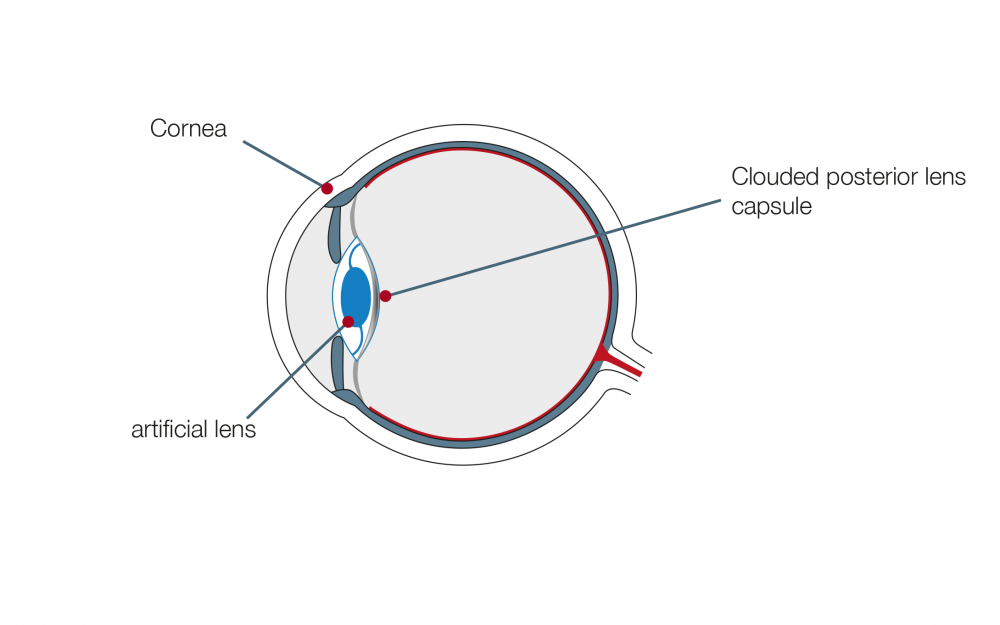
The use of trifocal and multifocal lenses is a safe and precise method of correcting presbyopia. The body’s natural lens is replaced by an artificial lens. As a rule, the capsule of the natural lens remains in the eye as a storage location for the new artificial lens. This capsule can become cloudy months or even years after the lens has been replaced – secondary clouding (cataract) occurs. Vision is again slightly blurred and cloudy. The treatment of the cataract is possible with a short painless procedure. A short laser treatment is carried out with the help of a light and thus the cataract is eliminated. The success is quickly visible and gives you a clear view again.
Refractive lens replacement / RLE: from 2.850,- € for one eye*.
Phake lenses (ICL/Cachet): from 3.125,- € for one eye*.
Trifocal/multifocal intraocular lenses / M-IOL: from € 3,300 for one eye*.
*The cost depends on the amount of your refractive error, the condition of your cornea and the type of lenses used.
During the multifocal operation the old intraocular lens is partly replaced by a new multifocal lens implant which make it possible for you lifelong to see far, near and intermedia without glasses. During the operation the old lens is only partly removed leaving the old lens-capsula in the eye, serving as a bag positioning and keeping the new lens exactly at the right place in the eye. At the time of surgery this “old” bag is totally clear and visible. During the next weeks to months after the operation this bag may develop a little haze (secondary cataract), The patient may feel that the vision for far or for near become a little blurry. If you feel this should be the case please contact us. We will very easily to be able with a small light beam to remove the haze and you will fell immediately an improvement.
About EuroEyes
The EuroEyes clinic group is a globally successful company that was founded more than 30 years ago in Hamburg, Germany, where it is still headquartered today. In addition to locations throughout Germany, EuroEyes is also represented in China and Denmark and England. The company offers patients the entire spectrum of refractive surgery to correct refractive errors. Using state-of-the-art laser eye and lens surgery procedures, EuroEyes treats more than 25,000 patients annually with nearsightedness, farsightedness, astigmatism, presbyopia or cataracts. Each of our experienced top doctors performs more than 1,000 eye operations every year. In total, with more than 1,000,000 treatments, we have enabled our patients to live with freedom without glasses and contact lenses.Follow us on social media:





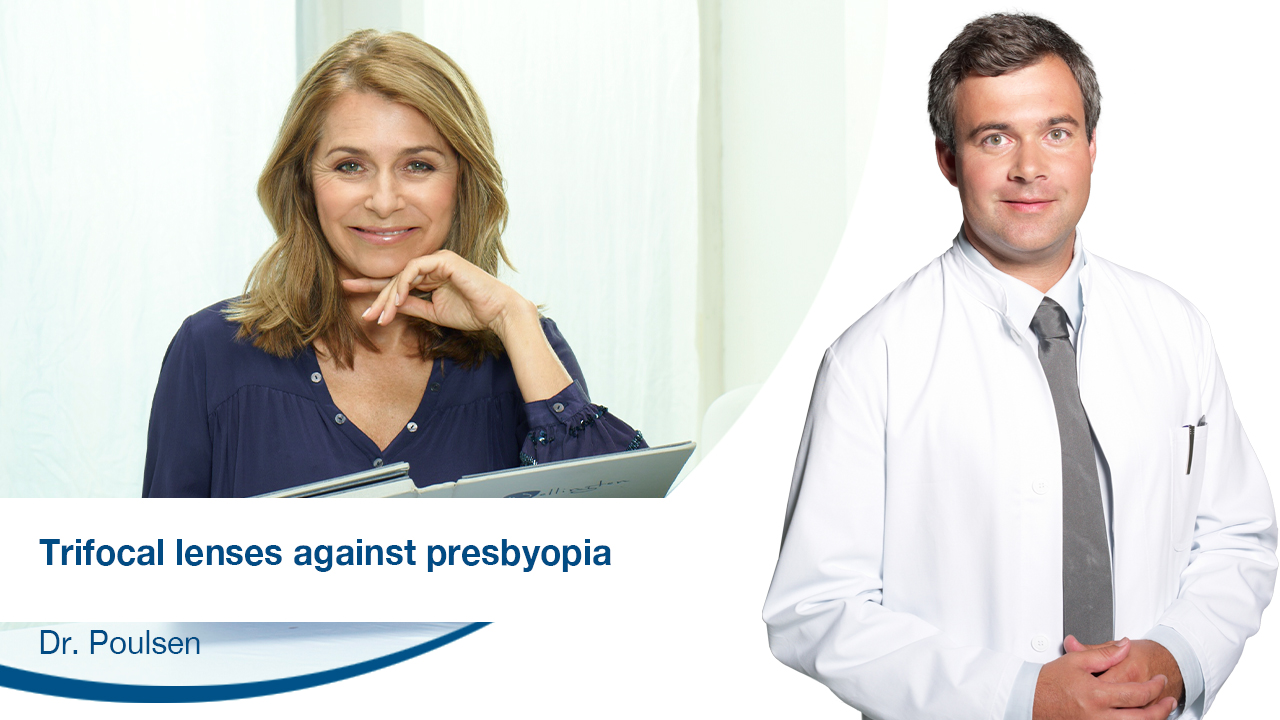
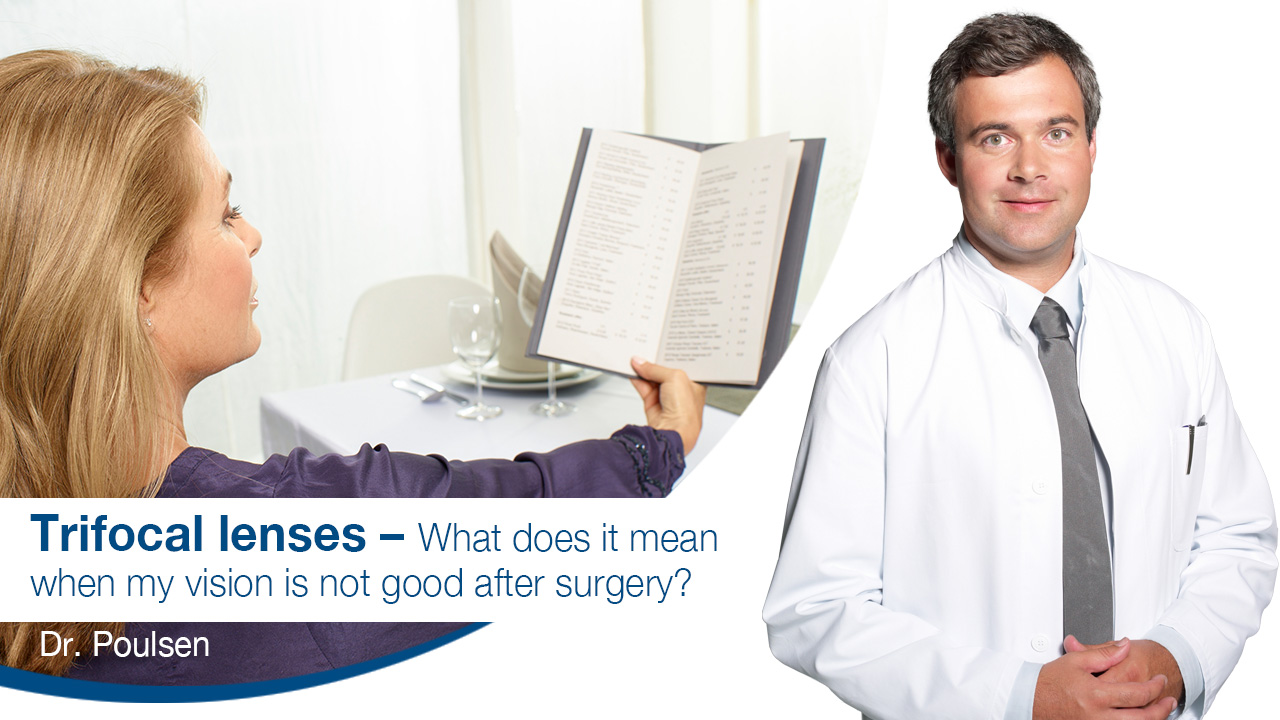
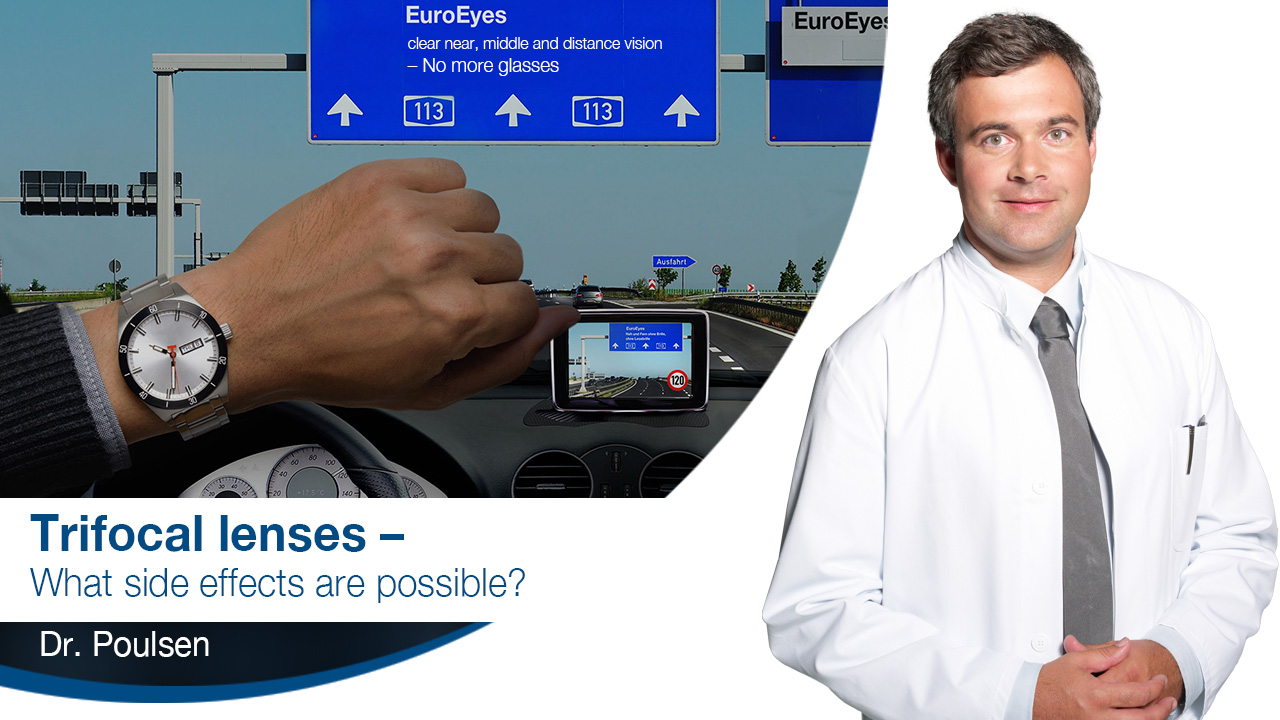
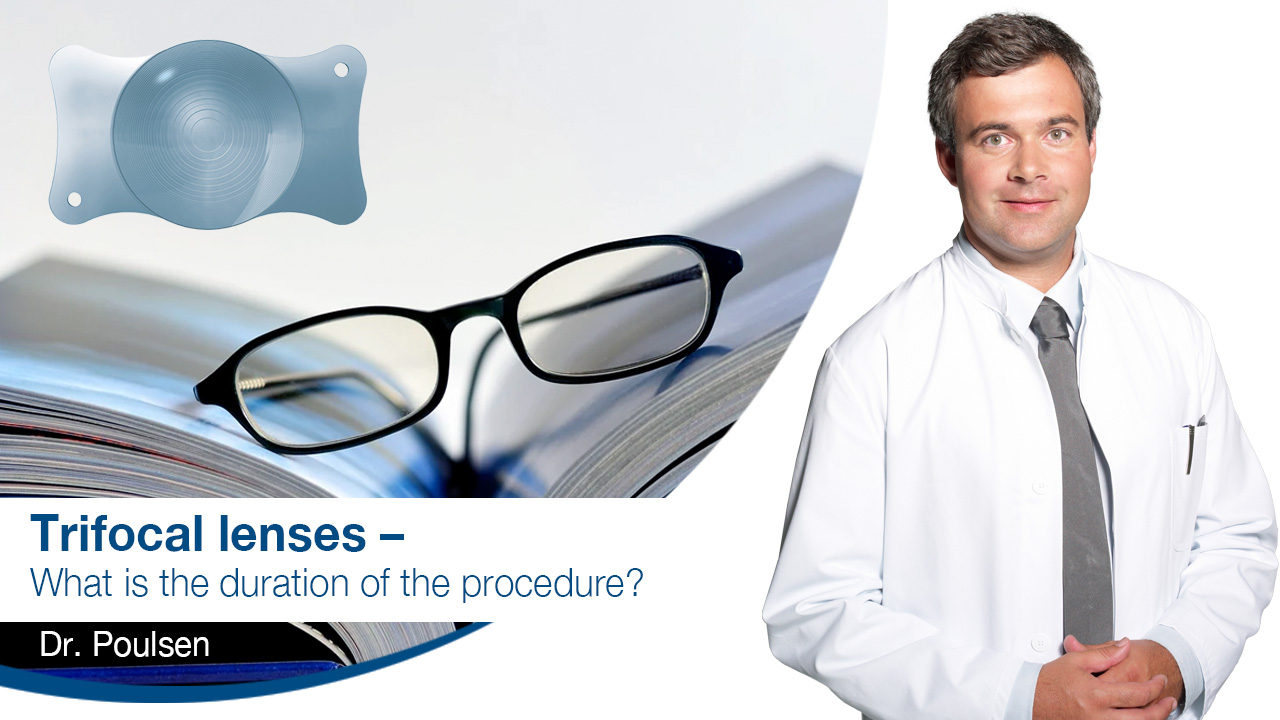

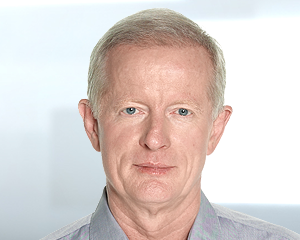

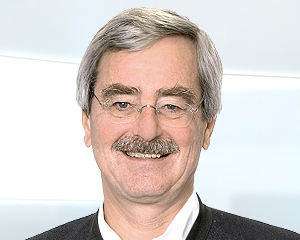
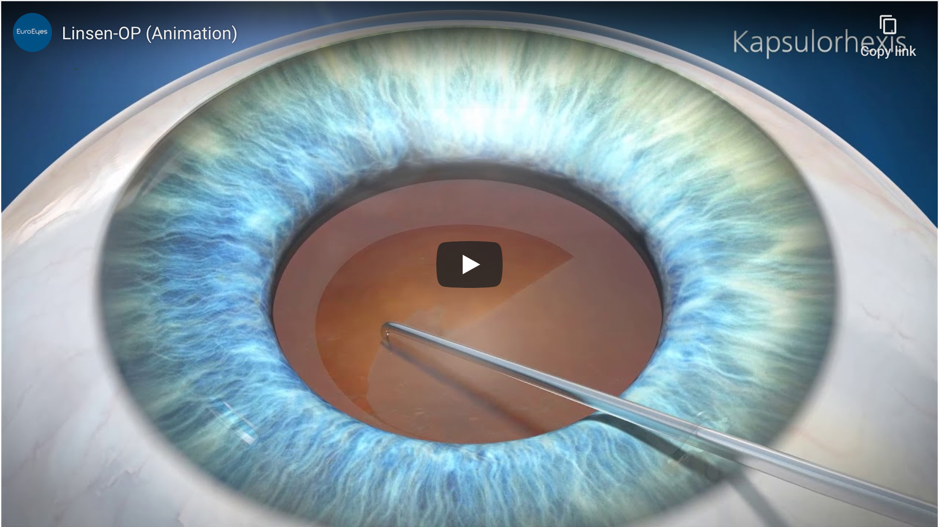




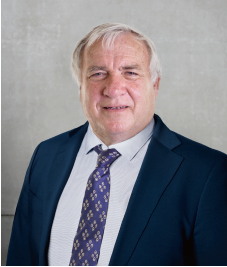

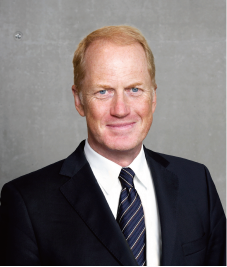

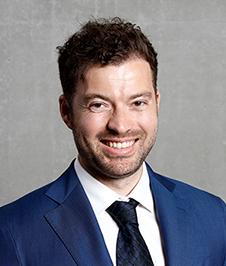
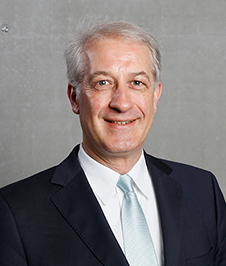
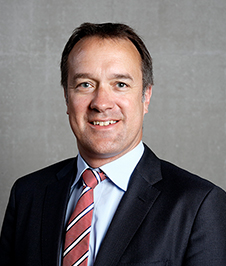
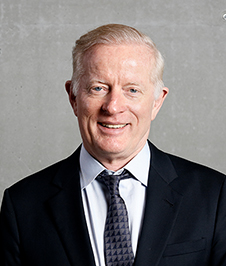


Join our Newsletter